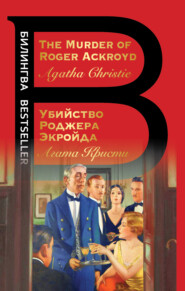По всем вопросам обращайтесь на: info@litportal.ru
(©) 2003-2024.
✖
Hallowe’en Party
Автор
Год написания книги
2019
Настройки чтения
Размер шрифта
Высота строк
Поля
‘What shall I get you?’ said Spence. ‘No fancy stuff here, I’m afraid. No blackcurrant or rose hip syrup or any of your patent things. Beer? Or shall I get Elspeth to make you a cup of tea? Or I can do you a shandy or Coca-Cola or some cocoa if you like it. My sister, Elspeth, is a cocoa drinker.’
‘You are very kind. For me, I think a shandy. The ginger beer and the beer? That is right, is it not?’
‘Absolutely so.’
He went into the house and returned shortly afterwards carrying two large glass mugs. ‘I’m joining you,’ he said.
He drew a chair up to the table and sat down, placing the two glasses in front of himself and Poirot.
‘What was it you said just now?’ he said, raising his glass. ‘We won’t say “Here’s to crime.” I’ve done with crime, and if you mean the crime I think you do, in fact which I think you have to do, because I don’t recall any other crime just lately, I don’t like the particular form of murder we’ve just had.’
‘No. I do not think you would do so.’
‘We are talking about the child who had her head shoved into a bucket?’
‘Yes,’ said Poirot, ‘that is what I am talking about.’
‘I don’t know why you come to me,’ said Spence. ‘I’m nothing to do with the police nowadays. All that’s over many years ago.’
‘Once a policeman,’ said Hercule Poirot, ‘always a policeman. That is to say, there is always the point of view of the policeman behind the point of view of the ordinary man. I know, I who talk to you. I, too, started in the police force in my country.’
‘Yes, so you did. I remember now your telling me. Well, I suppose one’s outlook is a bit slanted, but it’s a long time since I’ve had any active connection.’
‘But you hear the gossip,’ said Poirot. ‘You have friends of your own trade. You will hear what they think or suspect or what they know.’
Spence sighed.
‘One knows too much,’ he said, ‘that is one of the troubles nowadays. There is a crime, a crime of which the pattern is familiar, and you know, that is to say the active police officers know, pretty well who’s probably done that crime. They don’t tell the newspapers but they make their inquiries, and they know. But whether they’re going to get any further than that—well, things have their difficulties.’
‘You mean the wives and the girl friends and the rest of it?’
‘Partly that, yes. In the end, perhaps, one gets one’s man. Sometimes a year or two passes. I’d say, you know, roughly, Poirot, that more girls nowadays marry wrong ’uns than they ever used to in my time.’
Hercule Poirot considered, pulling his moustaches.
‘Yes,’ he said, ‘I can see that that might be so. I suspect that girls have always been partial to the bad lots, as you say, but in the past there were safeguards.’
‘That’s right. People were looking after them. Their mothers looked after them. Their aunts and their older sisters looked after them. Their younger sisters and brothers knew what was going on. Their fathers were not averse to kicking the wrong young men out of the house. Sometimes, of course, the girls used to run away with one of the bad lots. Nowadays there’s no need even to do that. Mother doesn’t know who the girl’s out with, father’s not told who the girl is out with, brothers know who the girl is out with but they think “more fool her”. If the parents refuse consent, the couple go before a magistrate and manage to get permission to marry, and then when the young man who everyone knows is a bad lot proceeds to prove to everybody, including his wife, that he is a bad lot, the fat’s in the fire! But love’s love; the girl doesn’t want to think that her Henry has these revolting habits, these criminal tendencies, and all the rest of it. She’ll lie for him, swear black’s white for him and everything else. Yes, it’s difficult. Difficult for us, I mean. Well, there’s no good going on saying things were better in the old days. Perhaps we only thought so. Anyway, Poirot, how did you get yourself mixed up in all this? This isn’t your part of the country, is it? Always thought you lived in London. You used to when I knew you.’
‘I still live in London. I involved myself here at the request of a friend, Mrs Oliver. You remember Mrs Oliver?’
Spence raised his head, closed his eyes and appeared to reflect.
‘Mrs Oliver? Can’t say that I do.’
‘She writes books. Detective stories. You met her, if you will throw your mind back, during the time that you persuaded me to investigate the murder of Mrs McGinty. You will not have forgotten Mrs McGinty?’
‘Good lord, no. But it was a long time ago. You did me a good turn there, Poirot, a very good turn. I went to you for help and you didn’t let me down.’
‘I was honoured—flattered—that you should come to consult me,’ said Poirot. ‘I must say that I despaired once or twice. The man we had to save—to save his neck in those days I believe, it is long ago enough for that—was a man who was excessively difficult to do anything for. The kind of standard example of how not to do anything useful for himself.’
‘Married that girl, didn’t he? The wet one. Not the bright one with the peroxide hair. Wonder how they got on together. Have you ever heard about it?’
‘No,’ said Poirot. ‘I presume all goes well with them.’
‘Can’t see what she saw in him.’
‘It is difficult,’ said Poirot, ‘but it is one of the great consolations in nature that a man, however unattractive, will find that he is attractive—to some woman. One can only say or hope that they married and lived happily ever afterwards.’
‘Shouldn’t think they lived happily ever afterwards if they had to have Mother to live with them.’
‘No, indeed,’ said Poirot. ‘Or Step-father,’ he added.
‘Well,’ said Spence, ‘here we are talking of old days again. All that’s over. I always thought that man, can’t remember his name now, ought to have run an undertaking parlour. Had just the face and manner for it. Perhaps he did. The girl had some money, didn’t she? Yes, he’d have made a very good undertaker. I can see him, all in black, calling for orders for the funeral. Perhaps he can even have been enthusiastic over the right kind of elm or teak or whatever they use for coffins. But he’d never have made good selling insurance or real estate. Anyway, don’t let’s harp back.’ Then he said suddenly, ‘Mrs Oliver. Ariadne Oliver. Apples. Is that how she’s got herself mixed up in this? That poor child got her head shoved under water in a bucket of floating apples, didn’t she, at a party? Is that what interested Mrs Oliver?’
‘I don’t think she was particularly attracted because of the apples,’ said Poirot, ‘but she was at the party.’
‘Do you say she lived here?’
‘No, she does not live here. She was staying with a friend, a Mrs Butler.’
‘Butler?’ Yes, I know her. Lives down not far from the church. Widow. Husband was an airline pilot. Has a daughter. Rather nice-looking girl. Pretty manners. Mrs Butler’s rather an attractive woman, don’t you think so?’
‘I have as yet barely met her, but, yes, I thought she was very attractive.’
‘And how does this concern you, Poirot? You weren’t here when it happened?’
‘No. Mrs Oliver came to me in London. She was upset, very upset. She wanted me to do something.’
A faint smile showed on Superintendent Spence’s face.
‘I see. Same old story. I came up to you, too, because I wanted you to do something.’
‘And I have carried things one step further,’ said Poirot. ‘I have come to you.’
‘Because you want me to do something? I tell you, there’s nothing I can do.’
‘Oh yes there is. You can tell me all about the people. The people who live here. The people who went to that party. The fathers and mothers of the children who were at the party. The school, the teachers, the lawyers, the doctors. Somebody, during a party, induced a child to kneel down, and perhaps, laughing, saying: “I’ll show you the best way to get hold of an apple with your teeth. I know the trick of it.” And then he or she—whoever it was—put a hand on that girl’s head. There wouldn’t have been much struggle or noise or anything of that kind.’
‘A nasty business,’ said Spence. ‘I thought so when I heard about it. What do you want to know? I’ve been here a year. My sister’s been here longer—two or three years. It’s not a big community. It’s not a particularly settled one either. People come and go. The husband has a job in either Medchester or Great Canning, or one of the other places round about. Their children go to school here. Then perhaps the husband changes his job and they go somewhere else. It’s not a fixed community. Some of the people have been here a long time, Miss Emlyn, the school-mistress, has, Dr Ferguson has. But on the whole, it fluctuates a bit.’
‘One supposes,’ said Hercule Poirot, ‘that having agreed with you that this was a nasty business, I might hope that you would know who are the nasty people here.’
‘Yes,’ said Spence. ‘It’s the first thing one looks for, isn’t it? And the next thing one looks for is a nasty adolescent in a thing of this kind. Who wants to strangle or drown or get rid of a lump of a girl of thirteen? There doesn’t seem to have been any evidence of a sexual assault or anything of that kind, which would be the first thing one looks for. Plenty of that sort of thing in every small town or village nowadays. There again, I think there’s more of it than there used to be in my young day. We had our mentally disturbed, or whatever they call them, but not so many as we have now. I expect there are more of them let out of the place they ought to be kept safe in. All our mental homes are too full; over-crowded, so doctors say “Let him or her lead a normal life. Go back and live with his relatives,” etc. And then the nasty bit of goods, or the poor afflicted fellow, whichever way you like to look at it, gets the urge again and another young woman goes out walking and is found in a gravel pit, or is silly enough to take lifts in a car. Children don’t come home from school because they’ve accepted a lift from a stranger, although they’ve been warned not to. Yes, there’s a lot of that nowadays.’
‘Does that quite fit the pattern we have here?’
‘Well, it’s the first thing one thinks of,’ said Spence. ‘Somebody was at the party who had the urge, shall we say. Perhaps he’d done it before, perhaps he’d only wanted to do it. I’d say roughly that there might be some past history of assaulting a child somewhere. As far as I know, nobody’s come up with anything of that kind. Not officially, I mean. There were two in the right age group at the party. Nicholas Ransom, nice-looking lad, seventeen or eighteen. He’d be the right age. Comes from the East Coast or somewhere like that, I think. Seems all right. Looks normal enough, but who knows? And there’s Desmond, remanded once for a psychiatric report, but I wouldn’t say there was much to it. It’s got to be someone at the party, though of course I suppose anyone could have come in from outside. A house isn’t usually locked up during a party. There’s a side door open, or a side window. One of our half-baked people, I suppose could have come along to see what was on and sneaked in. A pretty big risk to take. Would a child agree, a child who’d gone to a party, to go playing apple games with anyone she didn’t know? Anyway, you haven’t explained yet, Poirot, what brings you into it. You said it was Mrs Oliver. Some wild idea of hers?’

















